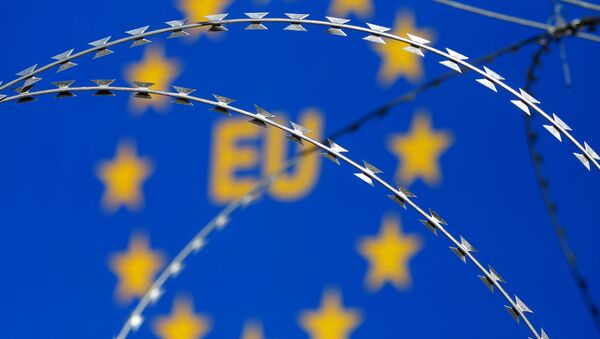Rather than pulling together to solve the crisis, European countries are splitting apart in the way they tackle the influx of migrants.
Razor wire fences, border controls and concrete reinforcements at checkpoints in countries along irregular migrant routes have exposed the cracks in the EU and the differences in opinion among its leaders.
#BalkanRoute effectively closed as #Slovenia, #Croatia and #Serbia impose new #refugee bans https://t.co/G3ZxqME32R pic.twitter.com/K0ESFo5dXG
— Sputnik UK (@SputnikNewsUK) March 9, 2016
Macedonia has blocked its border with Greece, Slovenia and Croatia have barred access to migrants hoping to travel through the country; Serbia is set to follow suit and Austria has imposed a limit on asylum seekers allowed to cross its borders.
And now more than 13,000 refugees and migrants remain trapped in Greece leaving Northern European leaders with little choice but to look further East to Turkey for help.
EU solidarity? 70,000 could be left stranded in 'parking lot' #Greece https://t.co/LnBuu6UDKX #RefugeeCrisis pic.twitter.com/Xu3TAERoma
— Sputnik UK (@SputnikNewsUK) February 29, 2016
Greece, whose economic crisis and near-exit from the Eurozone once dominated the European agenda, soon became synonymous with the failings of the European Union to tackle the refugee crisis. The country remains at the behest of Germany, France and Brussels ever since it made a deal with the Troika, Greece's creditors in Northern Europe. Or rather, the Troika, imposed more austere demands on the cash strapped country in order for it to remain in the Eurozone, exposing the economic divide between southern and northern Europe.
Rebellion? Eastern Europe ‘starts open confrontation with #Merkel' https://t.co/LPW2spuNbC #MigrantCrisis pic.twitter.com/lNLvZXUGgw
— Sputnik (@SputnikInt) February 14, 2016
'Clash of Conflicting Solidarities'
However, Bulgarian political scientist Ivan Krastev believes there is a new divide in Europe, this time between East and West.
Ivan Krastev on the differences between #CEE and WEurope and the solidarity crisis within EU https://t.co/SXC6D1Ov9W pic.twitter.com/96l2hJ9Bus
— jackie k (@dzhecki) March 9, 2016
In an interview with German newspaper Die Welt (DW), Mr Krastev said: "The financial crisis split the EU into creditors and debtors, tearing open a divide between north and south.
"Now the refugee crisis is dividing Europe between East and West… We are not just experiencing a lack of solidarity… we are experiencing the clash of conflicting solidarities: between national, ethnic and religious solidarity and our duty as human beings."
In the interview with DW, Krastev suggests that Eastern European nations do not feel obliged to demonstrate the same responsibility towards refugees as they do their own people.
"In most western European countries the refugee crisis has led to societal polarization, to a confrontation between those who are for and those who are against open-border policies, between those who open their homes to refugees and those that set fire to asylum centers.
"But the usually divided societies of Central and Eastern Europe are almost unanimous in their rejection of refugees".
In 2015, Hungary became one of the first EU member states to demonstrate defiance of the union by building a razor wire fence on its borders with Serbia and Croatia.
"If we cannot secure the outer border [of the EU], regardless of how costly or demanding that is, we will destroy the Schengen regime ourselves," said the Hungarian Prime Minister.
'More Than an Unhappy Coincidence'
Dubbed the "patron saint of the Balkans" by a German newspaper, Hungarian PM Viktor Orban sent 16,000 concrete pillars and 10,000 rolls of barbed wire to Macedonia, Slovenia and Bulgaria to help the Eastern European countries barricade their borders.
Brussels and Turkey threaten Europe, says #Hungary's PM Viktor Orban https://t.co/4V9Se4Six2 #RefugeeCrisis pic.twitter.com/p8v9RBN3vj
— Sputnik UK (@SputnikNewsUK) February 12, 2016
The Visegard Group, which brings together four central and Eastern European countries, Poland, the Czech Republic, Hungary and Slovakia are united in their approach to the refugee crisis. They want fences, not quotas, seeking to look after people living in their own country and not refugees fleeing theirs.
"The return of the East-West divide in Europe is more than just an unhappy coincidence," Krastev tells DW.
"It is rooted in history, demography and the turbulence of the post-Communist transitional period. At the time, there is a Central European 'popular uprising' against globalization.
"History weighs heavily on Eastern and Central Europe.
"Very often history contradicts the promises of globalism. Central Europe knows the benefits as well as the dark side of multi-cultural societies better than most other places in Europe," Mr Krastev said.
The European Union has made a deal with Turkey to ease the biggest refugee crisis since the Second World War. The one-for-one plan, yet to be finalized, will see every migrant arriving in Greece from Turkey, sent back to Turkey.
European lawmakers slam #EU-#Turkey US$3.35 billion deal as UN clashes with Brussels chiefs https://t.co/SBKul4LEYN pic.twitter.com/N1IBjRXlPU
— Sputnik UK (@SputnikNewsUK) March 9, 2016
And for every Syrian returned, a Syrian refugee living in Turkey will be resettled in the EU; but proposals to resettle refugees among EU countries have never been agreed among member states.



